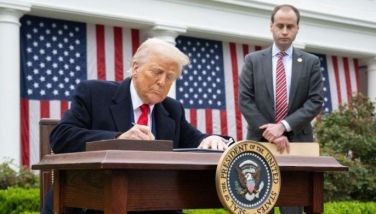How we have fallen

It’s so heartbreaking for our generation to see how we have fallen through the years.
Our country was not at the near bottom of ASEAN. Indeed, we were once upon a time, ahead of many of our neighboring tigers. I have seen this myself when I visited the original ASEAN countries back in 1969 as part of a goodwill delegation of the UP Student Council.
It isn’t just me. I received an email from a reader reacting to my column last Wednesday.
Here is what Raul Esguerra shared:
“Hi Boo,
“I have been in the semicon industry since the mid-70s. The Philippines is decades ahead of Vietnam, Thailand and Malaysia at that time, even more advanced than Taiwan. Stanford Microsystems and Dynetics were even bigger than TSMC then.
“Intel, Raytheon, Motorola, AMD, AMI, ZILOG, Fairchild, Texas Instruments, had their chip assembly here first, ahead of all ASEAN countries in the 70s.
“I set up the first gold wire manufacturing facility in Mactan, Cebu in 1995, primarily to support the local semiconductor assemblies with their gold wire requirements. The direction then was to set up local manufacturing to support the semiconductor manufacturing.
“I also saw the decline. Intel even expanded their Penang facility several times, leaving the Philippine plant stagnant, then moved to Gateway in Cavite, but ultimately closed it in favor of Vietnam.
“Yes, we were way ahead even of South Korea then, when Koreans were coming in the 60s to observe our TV manufacturing.”
Then I found this two-year-old posting on Reddit:
“What happened to the tech manufacturing prowess of the Philippines?
“I was looking at the power brick for my Nintendo Switch, and noticed a ‘Made in the Philippines’ print. This got me curious and searching for any history of tech manufacturing in the Philippines. I found out that we used to produce a lot of stuff for Japanese companies like Toshiba, Nikon, Canon, etc. back in the 90s and early 2000s.
“I was also shocked to see that even up to today, the country’s largest exports are semiconductors! Both top 1 and top 2 are, surpassing that of agriculture. I mean, WOW! Why isn’t this a well-known fact?
“Sadly, with my little ‘research’ time, I also found out that compared to other countries, we only manufacture low tech semis used for standard appliances and general use parts. We also used to have a leg up against Taiwan back then, and so I wonder, what happened? Is the PH semiconductor stagnating? Did we strategically choose not to produce high tech chips? Is it due to bad political decisions?”
That posting elicited this comment:
“A mix of corruption, high taxes and bureaucracy has made it impossible to manufacture in this country. Also, the fact that foreigners can’t even own their own company means they just don’t bother investing here. Why would Canon spend $100 million or whatever on a manufacturing plant if they have to sign over a percent of ownership to one of the few chosen families that get to own everything in this country?
“Any time you import or export goods, there is a good chance some of it will go missing or it will be held at customs for a period of time without good reason, for which you have to pay ‘warehouse fees’. Having to get licenses to import/export is also a huge unnecessary pain in the arse.
“The corporation tax in the Philippines is among the highest in Asia…
“Don’t even get me started on the bureaucracy. Just don’t even go there.
“It’s almost as if the whole thing is designed with the specific goal of deterring investment.”
In fairness, we have lately tried to remedy some structural issues. Foreign investors in tech companies can own their operations 100 percent now. The rent-seeking days of some elite families who force investors to take them in as partners with “laway” for equity contribution is over.
Foreign investors can’t own land but that has never been an issue with investors. They can’t own land in China and Vietnam but they go there. CREATE MORE has reduced corporate income tax to be more competitive with our neighbors. CREATE MORE also addresses the high power rates by allowing double expense deduction for power.
But our leaders moved late. Gloria Macapagal Arroyo, a PhD in Economics, did nothing in her 10 years in office to fix the investment climate at a time when investors were looking at Southeast Asia to put up factories. Now it is probably too late because the major investors are already committed to Malaysia, Vietnam and Thailand.
The beginning of the end started when Marcos, the father, declared martial law. His cronies took over key segments of the economy and displaced even Filipino industrialists. I remember how Roberto Benedicto killed the television manufacturing business of the late Domingo Guevara of Radiowealth when Benedicto was allowed by Malacañang to import television sets tax free.
According to Domingo Jr., in his father’s biography, a supposed Marcos emissary also expressed interest in the other businesses of the Guevaras and flatly told them no price would be paid and they should be flattered that Marcos wanted to invest in their company.
Succeeding presidents had their own sets of favored business cronies.
If the business environment is controlled by presidential cronies who are bullying the local entrepreneurs, why would foreign investors want to come in?
It also didn’t help that we as a people seem to have a generally anti-business attitude. Corruption is often justified by local officials and bureaucrats as “hindi bale, mayaman naman mga yan.”
Our main problem was and still is, having political leaders who are more interested in quickly enriching themselves than helping the nation’s economy grow. That is why I don’t think we will catch up with our neighbors any time soon.
(Sigh)
Boo Chanco’s email address is bchanco@gmail.com. Follow him on X @boochanco
- Latest
- Trending



























